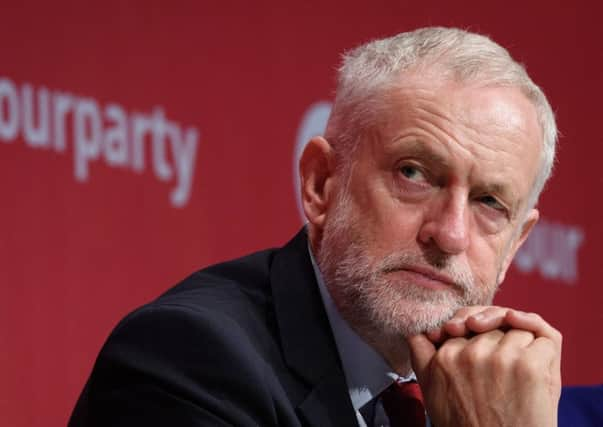Paris Gourtsoyannis: No end to Corbyn's Uber supremacy


A party rejuvenated by a not-so-narrow defeat that has somehow been received as a victory. A grassroots membership energised into a potent door-knocking force and stuffed with eager young activists. A leadership with a cult-like following, greeted at mass rallies like a rock star. A party conference with queues out the door and self-censorship on the floor.
This week in Brighton hasn’t felt as much like a Labour conference as a post-2014 SNP jamboree, with The Absolute Boy standing in for Oor Nicola.
Advertisement
Hide AdAdvertisement
Hide AdWith few willing to predict what the next three months in British politics will bring, let alone the next three years, the energy building in Labour means the prospect of Corbyn as PM has to be considered seriously.
But as with the SNP’s post-indyref surge, which has let the air out almost as quickly as it was inflated, questions remain to be answered about whether Labour’s support is as shallow as it is broad.
Two moments stood out yesterday. One was the standing ovation for Emily Thornberry, Labour’s happiest warrior, who single-handedly makes up for the lack of humour among Labour’s left-wing leading lights. She was like a gameshow host at the conference podium. The other was Dennis Skinner, a more traditional icon of the left who has the air of a man liberated. Decades fell away from the 85-year-old as he roared his answer to claims that Labour doesn’t have the money for its promises on public services and student debt: “We’re going to borrow it!”
In years gone by, Conservative HQ would have leapt at footage of a Skinner tirade calling for more borrowing as material for a campaign advert. They couldn’t have scripted yesterday’s outburst better. But if they’re wise, they won’t touch it, or John McDonnell’s casual commitment to spend £200bn on cancelling PFI contracts. They know it resonates with voters, rather than alienating them.
Long-time Labour watchers say the script has changed, but the energy in Brighton is equal to, if not in excess of the Things Can Only Get Better heyday of Tony Blair.
Wags have poked fun at a comment from erstwhile journalist and Corbyn booster Paul Mason, who said the vibrancy of the atmosphere and debate reminded him of the 1980s. “Only 17 years to wait for power!” was the reply.
There has been a lot of fun had at union chiefs and Labour activists who claim their party actually won the election in June. But in truth, this feels like a party and a movement that is getting serious about actually winning. Charles Moore wrote that Jeremy Corbyn got serious about trying to get into Downing Street when he smartened up for PMQs by putting on a suit and straightening his tie.
A clearer sign of that ambition was the Blairite move of avoiding a floor vote on Labour’s Brexit policy, and keeping potentially awkward and divisive debate to a minimum. Blair’s former vanguard in the Progress wing of the party have howled from the sidelines at this conference, but they must recognise their old tactics.
Advertisement
Hide AdAdvertisement
Hide AdAnother sign of Corbyn’s growing ambition is his willingness to bend in the face of pressure from opponents, rather than remain inflexible and snap. The Labour leader tried to cling to his long-held, erroneous belief that EU state aid rules would prevent him from delivering some of his most treasured policies, like supporting the steel industry and nationalising rail and postal services.
But the significant noises from Corbyn and McDonnell were a commitment to listen to dissent over Europe, and an ambition to negotiate a new deal on free movement that could make single market membership acceptable in the long term. Labour’s Brexit policy has all the ‘constructive ambiguity’ of David Davis’ approach to talks in Brussels, but it is a tightrope walk that the party leadership has survived, so far.
The barely-contained divisions over Europe have dominated coverage from Brighton. But to understand where things could still go wrong for Labour, it is worth considering the party’s deeper, hidden fault line - how are delegates getting home in the evening?
Last week, Transport for London told the app-based taxi company Uber that it was not renewing its operating license over concerns about how safety issues were being managed and reported.
The row instantly took on broader meaning. Like many giant multinationals of the new digital, sharing economy, Uber has faced criticism over how it treats its workers, as well as its respect for local regulations in the countries it operates. Losing the right to operate in London is the culmination of a long legal and PR campaign by the GMB union. But the decision has also prompted a backlash from Uber’s users, with more than half a million signing a petition demanding its reinstatement.
That fault line runs down the middle of the Labour movement Jeremy Corbyn has built. The true believers, whose left-wing credentials are well-established and probably older Uber itself, likely agree with the shadow business secretary, Rebecca Long-Bailey, who suggested earlier this year that the company’s actions were “morally wrong” and worthy of boycott.
The recruits, many of whom are the same young, digital native non-voters who flocked to Labour at the election in June, are Uber users. They have chanted ‘Oh, Jeremy Corbyn’ at rallies, late-night discos and in the conference hall, but when it’s time to go home, they’ve hailed an Uber on their phone. The spike in demand around Brighton via the app has triggered one of the company’s more controversial practices, ‘surge pricing’.
While the adherence of one group to the uncompromising politics of the other has given the conference much of its energy, the cultural divide remains. Brexit is the issue most likely to open the divide, but the SNP can’t have predicted they would be outflanked to the left and made to look a bit stale by Corbyn’s rise. For now, though, it’s his Labour party.